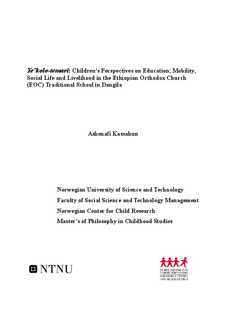| dc.contributor.advisor | Abebe, Tatek | nb_NO |
| dc.contributor.author | Kassahun, Ashenafi | nb_NO |
| dc.date.accessioned | 2014-12-19T14:37:33Z | |
| dc.date.available | 2014-12-19T14:37:33Z | |
| dc.date.created | 2013-03-19 | nb_NO |
| dc.date.issued | 2012 | nb_NO |
| dc.identifier | 612027 | nb_NO |
| dc.identifier.uri | http://hdl.handle.net/11250/269074 | |
| dc.description.abstract | The goal of this study was to explore Yek’olo-temari children’s perspective on education, mobility, livelihood and social life in the Ethiopian Orthodox Church (EOC) traditional school. It was conducted based on two months ethnographic fieldwork in Dangila, Ethiopia. Data were collected using interview, participant observation, focus group discussions and field notes from children who are at the age of 15 and below in addition to the lead teacher.
The role of the traditional/religious beliefs of their parents and the children themselves had significant contribution for children to enroll in the traditional school of EOC. All of Yek’olotemari children were migrated from the neighboring rural areas of Dangila. The children migrate to Dangila to evade from domestic works which interfere with their study. Moreover, there is less access to the traditional than the modern schools. Yek’olo-temari children have limited contact with their parents because they believe it will interrupt with their daily rehearsal (which is the major learning mechanisms in the school) if they went back to visit them frequently by engaging in different social and domestic work activities.
The major livelihood strategies of Yek’olo-temari children were a combination of begging with small poultry entrepreneurship. Beyond subsistence, begging has a traditionally transmitted belief that the children’s understanding will be escalated if they beg. Begging food is seen as an activity that instills religious discipline and spiritual development. The daily life of Yek’olo-temari children is dominated by educational activity. The children and the lead teacher, believed that play is less important than education which is considered as a childish activity and a reflection of less maturity. Yek’olo-temari children’s social relationships were found out to be horizontal, vertical and institutional social relationships. In the horizontal (peer) relationship, sharing and cooperation characterized their friendship after it is initiated by social networking. In the vertical relationships, interdependence was manifested in the children’s social relationships with the older students and Yeneta (lead teacher). Yeneta has the role of social fatherhood beyond the teacher-student relationships. In the institutional relationships, while the church/school offered free education, the children gave different services for the church/school at least once a week. Moreover, their role in perpetuating the tradition for the next generation made the church/school significantly dependent on the children. In this way, the study revealed that Yek’olo-temari children and the church/school were socially interdependent and their lives contrast the dominant model of childhood as work-free, playful phase of life course
. | nb_NO |
| dc.language | eng | nb_NO |
| dc.publisher | Norges teknisk-naturvitenskapelige universitet, Fakultet for samfunnsvitenskap og teknologiledelse, Norsk senter for barneforskning | nb_NO |
| dc.subject | Social and Behavioural Science, Law | en_GB |
| dc.title | Ye'kolo-temari: Children's Perspectives on Education, Mobility, Social Life and Livelihood in the Ethiopian Orthodox Church (EOC) Traditional School in Dangila | nb_NO |
| dc.type | Master thesis | nb_NO |
| dc.contributor.department | Norges teknisk-naturvitenskapelige universitet, Fakultet for samfunnsvitenskap og teknologiledelse, Norsk senter for barneforskning | nb_NO |
